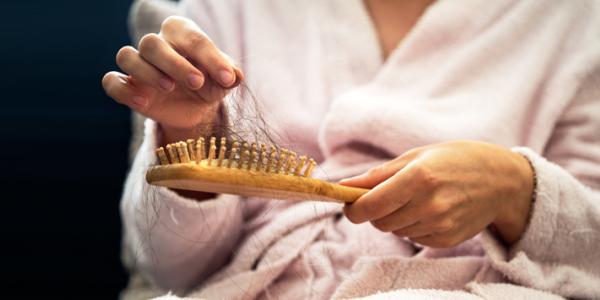


If you're struggling with hair loss, don't despair – the problem may respond to treatment or even resolve itself over time. The first step is to consult a board-certified dermatologist and find out what is causing your hair loss. Different causes require different treatments. Moreover, two people with the same type of hair loss won't necessarily respond to treatment the same way.
Both men and women can inherit genes that cause hair follicles – the tiny tubes hair grows out of – to stop growing hair. This is called male or female pattern baldness. In men, thinning begins as a receding hair line or a bald spot at the top of the head. Women will notice a widening part, or overall thinning.
Even if pattern baldness doesn't run in your family, hair growth slows with age and starts to lose its color.
Women are susceptible to hair loss due to changes in the balance of the female hormone estrogen. This can happen for a variety of reasons:
Hair loss is a possible side effect of some types of medications, including:
Just because you are taking a certain medication does not mean you will experience hair loss as a side effect. What's more, in the majority of cases, hair will grow back once the medication is stopped. Do not stop taking it before talking to your doctor. Your hair loss could have another cause and suddenly stopping a medication can cause serious health problems.
As many cancer survivors know all too well, chemotherapy can cause you to lose most or all of your hair within a few weeks of starting treatment. In recent years, infusion centers have started offering patients cold caps. The cold constricts small blood vessels in the scalp to reduce the amount of medication reaching the hair follicles, so hair is less likely to shed. Radiation treatment to the head or neck and the drug Tamoxifen, used to treat breast cancer or reduce the risk of recurrence, are also associated with hair loss.
Hair dye, perms, and relaxers can damage hair and lead to hair loss over time. If you wear your hair tightly pulled back, you could develop "traction alopecia", a type of hair loss that is permanent. African American hair styles that require the use of weaves, rows, braids, chemical relaxers, or hot combs are especially hard on hair. All of these styling practices inflame the follicles and can lead to a permanent type of hair loss called central centrifugal cicatricial alopecia (CCCA), a circular pattern of hair loss that starts at the crown of the head and radiates out. If your scalp hurts during and after styling, you may be damaging your hair follicles.
Some people experience temporary hair loss a few months after a stressful experience, such as surgery, serious illness, divorce, or the death of a loved one.
If you're not getting enough biotin, protein, or zinc, you can lose a fair amount of hair. A dermatologist will order a blood test to determine if that is the case. Some supplements, such as iron, are toxic if you take too much, so determine the dose with your doctor.
A variety of medical issues can cause you to lose hair:
A variety of toxic substances can lead to hair loss if ingested. Arsenic, thallium, mercury, lead, warfarin, and lithium are just a few of these. Excess amounts of vitamin A or selenium can also cause you to lose hair.
Hair loss should be viewed as a symptom. You need to see a dermatologist to determine the cause. The doctor will ask questions and examine your scalp, nails, and other areas of hair loss. They may need to do a blood test or scalp biopsy.
Not every type of hair loss can be treated. If your hair follicles are damaged, there may not be much the doctor can do. On the other hand, you may learn that your condition is temporary, and your hair will grow back. Or you may be prescribed one or more of the following treatments:
Whatever the cause of your hair loss, be patient! Treatments take time to work, and hair grows back slowly. Find a dermatologist to help you with your hair loss.
This article first appeared in the February 2025 edition of the HealthPerks newsletter.

Identify your risk factors and what to do if you are at risk.